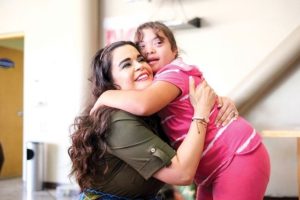
Here are some simple tips to help when you find you need to explain your child’s disability to their peers.
Parenting a child with a disability means that you see firsthand how hard it is for your child to make friends. The unfortunate truth is that our present society is not so welcoming to people with disabilities. However, this doesn’t have to be the case. Although children can be the source of serious teasing and bullying, they are also capable of being the kindest and most open-minded people. It’s so important to teach children about acceptance because it will benefit them and the people they come into contact with throughout their lives. Here are some simple tips to help when you find you need to explain your child’s disability to their peers.
Model Respectful Conversation
Oftentimes, when children see someone who has a disability, they might be shocked or even afraid at first. On the other hand, many children aren’t afraid to stare openly or make unwarranted comments. Remember to be patient and take this as a teaching opportunity. Let other children know that you are open to answering their questions. And try to explain your child’s disability in a calm and straightforward manner. Breaking the ice a little bit can be enough for your child and the other children to become comfortable with each other. When talking to children, set an example of respectful language to use. For example, use words that emphasize that, although your child is different, there is nothing “wrong” with them. You probably know that it’s best to avoid phrasing like “he’s autistic” or “she’s disabled” because it equates your child to the disability. Instead, saying, “he has autism” will help other kids to see that your child is a full person whose identity is not limited to their disability.
Focus on Positivity
Children tend to lack a filter when it comes to reacting in ways that could be hurtful towards a child with a disability. They might not realize it’s offensive to use blunt phrasing like “what’s wrong with her legs?” when they see a girl in a wheelchair. However, a child’s natural openness is a gift because they don’t have the same barriers adults have that cause people to subconsciously distance themselves from someone with a disability. Embrace the opportunity to point out the positive aspects of your child. Talk about how they are similar, or encourage your child to talk about their favorite color or movie, for example. The more you do this, the easier it will be for children to understand that a child with a disability is still a normal person just like them.
The Connections Therapy Center
The Connections Therapy Center serves families of children and adolescents with disabilities and special needs. We are a team of experts in the fields of pediatric speech, occupational therapy, speech-language pathology, and behavioral sciences. As a team, we offer intensive hands-on therapy for children and adolescents, as well as informative and useful resources for families. If you are interested in learning more about what we can do to help your family, visit us online or give us a call at (301) 577-4333. Want to get more information on how to help your child thrive? Follow us on Facebook, Twitter, LinkedIn, and Pinterest.
